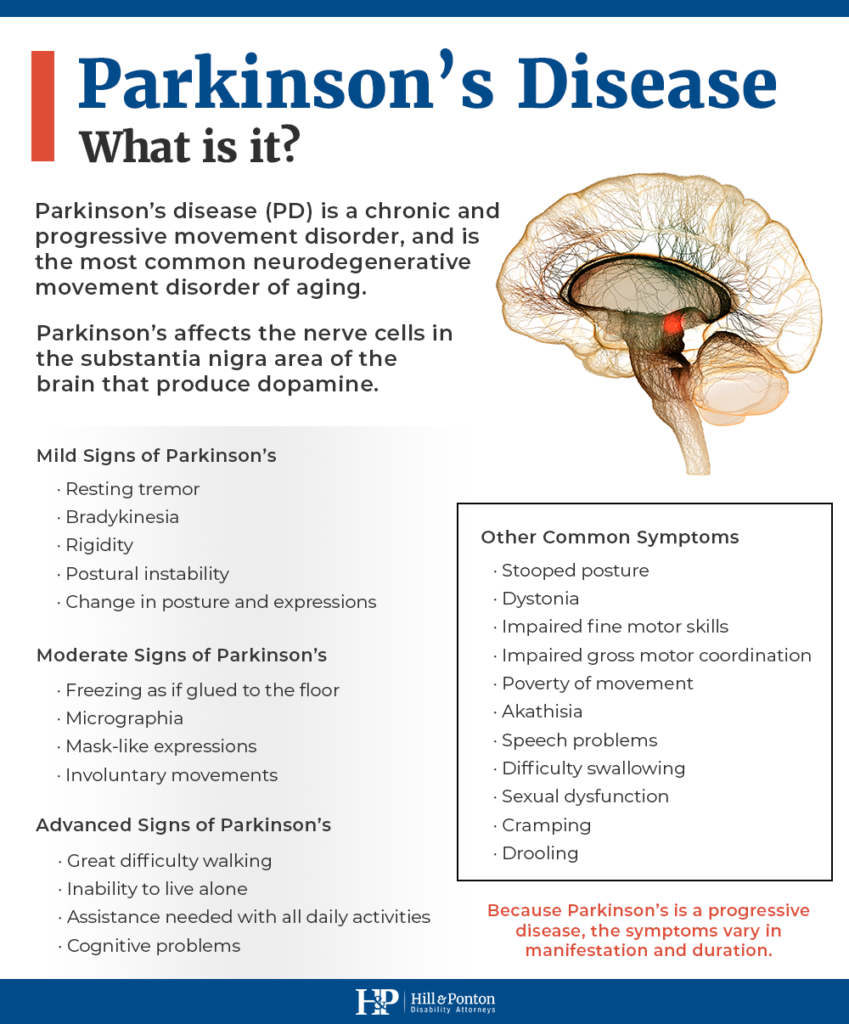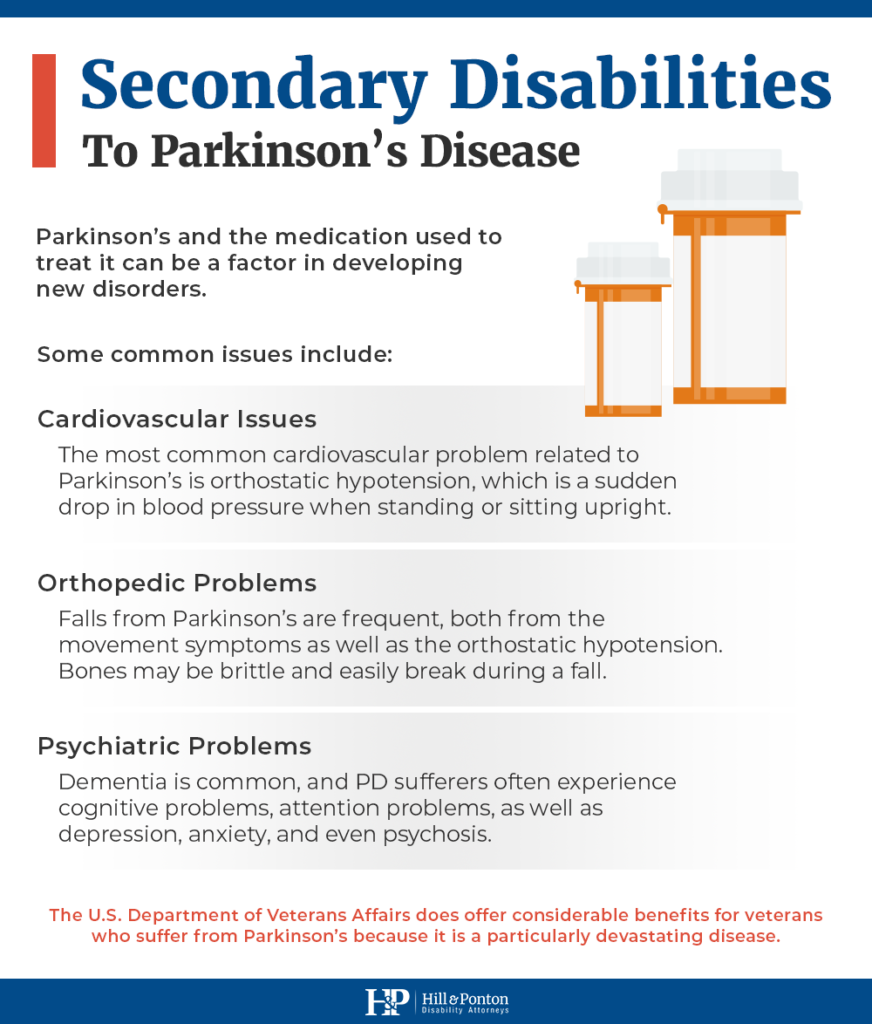If you are a former military service member living with Parkinson’s Disease, you may be eligible for disability compensation through the United States Department of Veterans Affairs. There are a few steps that you will need to complete to receive these disability benefits.
Specifically, veterans need to prove service connection for their condition. You may also be eligible for benefits based on conditions that are secondary to Parkinson’s Disease. Based on these factors, the VA will calculate a disability rating to determine compensation.
It’s also important to note that Vietnam veterans may be eligible for benefits for Parkinson’s Disease related to Agent Orange exposure. This guide will go over all of these factors, so you can start your disability claim and receive compensation for your medical conditions.
What Is Parkinson’s Disease?
Parkinson’s disease (PD) is a chronic and progressive movement disorder, and is the most common neurodegenerative movement disorder of aging. Parkinson’s affects the nerve cells in the substantia nigra area of the brain that produce dopamine. Dopamine is a chemical that sends messages to the part of the brain that controls movement and coordination. As Parkinson’s progresses, the amount of dopamine produced in the brain decreases, leaving a person unable to control movement normally.

Common Symptoms of Parkinson’s Disease
Because Parkinson’s is a progressive disease, the symptoms vary in manifestation and duration. Listed below are signs of Parkinson’s at the initial/mild stage, the secondary/moderate stage, and advanced stage. We also cover parkinson-like symptoms.
Initial/Mild Sign of Parkinson’s:
- Resting tremor
- Bradykinesia – slow movement
- Rigidity – stiffness & inflexibility of the limbs, neck & trunk
- Postural Instability – tendency to be unstable when standing upright
- Change in posture and facial expressions
Secondary/Moderate Signs of Parkinson’s:
- Freezing – the temporary sensation of one’s feet being glued to the floor
- Micrographia
- Mask-like expressions
- Involuntary movements
Advanced Signs of Parkinson’s:
- Great difficulty walking; in wheelchair or bed most of the day
- Inability to live alone
- Assistance needed with all daily activities
- Cognitive problems, including hallucinations and delusions
Other Common Signs of Parkinson’s:
- Stooped posture, a tendency to lean forward
- Dystonia
- Impaired fine motor dexterity and motor coordination
- Impaired gross motor coordination
- Poverty of movement (decreased arm swing)
- Akathisia
- Speech problems, such as softness of voice or slurred speech caused by lack of muscle control
- Difficulty swallowing
- Sexual dysfunction
- Cramping
- Drooling
Causes of Parkinson’s Disease
In spite of decades of study, the causes of Parkinson’s have yet to be determined but we do know of several risk factors. Many experts believe Parkinson’s may be caused by a combination of genetic and environmental factors, but these can vary case by case. Physical injuries to the brain have also been linked with neurological conditions.
Parkinson’s Disease and Traumatic Brain Injuries
Additionally, a 2018 study published in Neurology, demonstrated an increased risk of Parkinson’s disease and parkinson like symptoms from traumatic brain injuries; the report used U.S. military and VA’s databases to identify vets with TBIs to study.
Below, we’ll get into certain environmental factors, such as occupational exposure to chemicals, that have been linked to Parkinson’s.

Chemical Exposure & Parkinson’s Disease
Of the chemicals that have been most suspected risk factors for Parkinson’s, TCE holds the most proof of causing Parkinson’s. A colorless, non-flammable halocarbon, trichloroethylene dissolves most fixed and volatile oils. It is a powerful solvent action for fats, greases, waxes, oils, and tars. Type 1 TCE is used in dry-cleaning and for general solvent purposes. Type 2 TCE is used for vapor degreasing of metals. Over 90 percent of TCE is consumed by the metal degreasing and dry-cleaning trades.Studies of discordant twins, as well as experiments in laboratories, have shown that people chronically (eight to 33 years) exposed to TCE were more likely to develop Parkinson’s than the those who had not.
Military veterans have been seeing these results more than most. For decades, TCE had a wide variety of purposes in the military—from paint thinner to parts cleaner— and involved constant handling. After months or even years of inhaling and handling this chemical with little or no protection, veterans see Parkinson’s symptoms appear. While chemical exposure resulting in Parkinson’s has not been officially recognized by the VA as a presumptive disease, it is still possible to get VA benefits. In order to increase chances of winning these kinds of cases, it would be advisable to get a medical opinion by a doctor or specialist in that field. The verbiage that the VA needs to see is that “it is at least as likely as not” that the veteran’s conditions were caused by (for the purposes of this post) constant handling of TCE, and thus are service connected.
Agent Orange & Parkinson’s Disease
Agent Orange was used in chemical warfare during the Vietnam War. Since then, Vietnam veterans have developed a variety of symptoms related to Agent Orange exposure–including Parkinson’s Disease.
There is research that is starting to show exposure to certain chemicals do cause Parkinson’s Disease, and some of those chemicals such as TCE and PCE have been found in the water of Camp Lejeune. There is also evidence that Agent Orange herbicide exposure causes Parkinson’s, which the VA has now conceded. Parkinson’s Disease is one of the presumptive conditions related to Agent Orange that the VA recognizes.
According to the Parkinson’s Foundation, the main chemical in Agent Orange, called dioxin, is the main culprit in causing disease.
Agent Orange has also been linked to respiratory cancer, multiple myeloma, prostate cancer, bladder cancer, lymphoma, soft tissue sarcoma, and chronic b-cell leukemias. This service connection is particularly prevalent for Vietnam War veterans.
If you were exposed to Agent Orange and have Parkinson’s, you are able to take advantage of the VA’s rules for presumptive service connection. This is a relatively simple case if you served on the landmass or “brown water” of Vietnam, but for other veterans, including Blue Water veterans, claiming the presumption has been more difficult. With the expected changes coming to the VA law regarding Blue Water veterans, many more veterans should soon be able to take advantage of the presumption of service connection for Parkinson’s disease.
2021: VA adding parkinsonism to the Agent Orange presumptive list
Vets that suffer from parkinsonism or Parkinson-like symptoms can now file a claim with the veterans association to receive disability compensation for their Parkinson-like symptoms caused by exposure to Agent Orange. Parkinsonism resembles Parkinson’sDisease but is not formally diagnosed as PParkinson’s
If you are suffering from tremors, slow movement, impaired speech, or muscle stiffness and were on active duty in an area that used Agent Orange; you can now receive disability compensation.
When congress passed the 2021 NDAA, they added three conditions to the presumptive exposure list of conditions, and one of those was parkinsonism-like symptoms. Contact your veteran’s affairs agent to start the claims process. If you’ve previously had a claim denied for parkinsonism, our law firm can assist you in the appeals process and get your health care and veterans benefits squared away.
To keep updated on changes to VA law, visit www.va.gov.
Service Connection For Parkinson’s Disease
Some former service members may be eligible for direct service connection, meaning something happened in military service that caused your Parkinson’s or the disease was first diagnosed or manifested during service. This service connection is not easy to prove and will almost always require an independent medical opinion to show that you were beginning to show signs of Parkinson’s during service or a particular chemical you were exposed to caused the condition.
Disability Ratings For Parkinson’s Disease
Once you are awarded service connection for Parkinson’s, the fight may not be over. This is mostly because of the VA disability claim and rating system the VA uses for Parkinson’s. The minimum rating you can be awarded by the VA for Parkinson’s disease is 30 percent, but if you fail to appeal that rating, you are potentially leaving thousands of dollars of benefits on the table.
The 30 percent rating is given to veterans who have the diagnosis of Parkinson’s, and is basically acknowledging that they have the condition. What many veterans do not realize is that once you are service connected for Parkinson’s Disease, you are entitled to service connection for all the other problems that the condition causes: talking, swallowing, walking, balance problems, using your hands, memory, concentration, depression, and many more. If you have Parkinson’s, you are entitled to a separate rating for any condition that it causes. As you may guess, this can be a long list, especially as the disease progresses.
If you are service connected for Parkinson’s, you also need to apply for a Total Disability Rating based on Individual Unemployability. Often veterans are initially rated as 30 percent disabled by the VA for Parkinson’s, but are on Social Security for Parkinson’s. If you are unable to work because of Parkinson’s, it is important to file a claim for individual unemployability with the VA, not only so you receive benefits at the 100 percent rate, but so you can receive what is known as Special Monthly Compensation as well.
Special Monthly Compensation (SMC) is compensation that is awarded above and beyond the 100 percent disability payments for conditions that are more serious and more debilitating than for which the 100 percent rate is able to compensate. For instance, you may be eligible for SMC is you are housebound or need aid and attendance. Or, you may be able to receive SMC for the loss of use of your hands, feet, or vision. Note that SMC is not a separate claim, and is instead part of the original appeal. When you appeal for a higher rating for Parkinson’s Disease, it is a good idea to also appeal for individual unemployability and any SMC to which you are entitled.

Disabilities Secondary to Parkinson’s Disease
While most people tend to think of Parkinson’s disorder as a neurological movement disorder, and it most certainly is, many people do not realize that other systems in the body can also be severely affected by Parkinson’s. Often, the same chemical exposure (for example Agent Orange,) can also cause other disorders, such as ischemic heart disease. However, often it is the Parkinson’s itself, or the medication used to treat it that is the causal factor in the development of a new disorder. Whether a veteran’s Parkinson’s was caused by exposure to the TCDD in agent orange, pesticides, trichloroethylene, or its origins are unknown, Parkinson’s cause many secondary health effects and disabilities.
Cardiovascular Issues from Parkinson’s
Parkinson’s is known as a neurodegenerative disorder; that is, it causes neurons to degenerate or decay. The most famous area for PD degeneration is in an area of the brain called the substantia nigra, where Parkinson’s causes the death of neurons that generate dopamine, a neurotransmitter which is involved with movement. However, more recent studies have also shown that Parkinson’s also attacks nerves in the heart which produce another neurotransmitter, noradrenaline. This typically takes place in the left ventricle and can have many complications.
Noradrenaline is the primary messenger used by the sympathetic nervous system, the system of the body used to control things we don’t consciously think about: the beating of the heart, breathing, blood pressure, even how dilated our pupils are at any given time.
The most common cardiovascular problem related to Parkinson’s is orthostatic hypotension, which is a sudden drop in blood pressure when standing or sitting upright. Many Parkinson’s patients may need to get out of bed or out of a chair extremely slowly to avoid passing out. This can cause FURTHER secondary disabilities, including orthopedic or muscular trauma due to falls.
Common medication for Parkinson’s Disease
Medications such as Levodopa can be a lifesaver to Parkinson’s sufferers, however up to 10% of those medicated by PD medications such as Levodopa, Carbidopa, and Entacapone experience cardiovascular symptoms such as irregular heartbeat, hypertension, ischemic heart disease, and stroke. One study found that 2.4% of patients who were taking carbidopa/levodopa had cardiovascular ischemic events, compared to only 1.1% in patients taking a placebo.
A 2013 study found a nearly three-fold increase in the risk of stroke in patients with Parkinson’s. There is also a two-fold increase in the risk of heart failure and a 50% increase in the risk of dying from heart failure in Parkinson’s patients.
Orthopedic Problems related to Parkinson’s Disease
While Parkinson’s Disease is a neurological disorder, it can quite frequently cause orthopedic problems. Falls from Parkinson’s are frequent, both from the movement symptoms as well as the orthostatic hypotension noted above. As Parkinson’s frequently attacks the elderly, their bones may be brittle and easily break during a fall. To make matters worse, Parkinson’s sufferers have an increased risk of developing osteoarthritis and osteoporosis. This is believed to be due to a loss of bone mass resulting from the fact that PD sufferers tend to move around a lot less than non-sufferers.
In those sufferers who have had severe falls or needed spinal or other surgery, the tremors associated with Parkinson’s often severely affect recovery, or make total recovery nearly impossible. A cast is designed to reduce movement of a recovering limb; involuntary tremors are not helpful in this regard.
Psychiatric Problems and Parkinson’s Disease
Both Parkinson’s itself, as well as the medications used to treat it, can have severe psychiatric effects that can often be extremely debilitating. Dementia is common, and PD sufferers often experience cognitive problems, attention problems, as well as depression, anxiety, and even psychosis.
As I mentioned above, the primary problem in Parkinson’s disease involves the creation of dopamine, and while dopamine is involved in movement, it also is involved in addictive behavior. Often, bizarre behavioral changes happen in patients who are being treated with Parkinson’s medication, such as sexual addiction, compulsive gambling, binge eating, and overuse of medications.
Other Issues related to Parkinson’s Disease
As I mentioned above, Parkinson’s affects the parts of our neurological system that works automatically, without effort. We do not will food along our digestive tract, or decide to start sweating more; it just happens. As such, many seemingly smaller problems can arise. Many Parkinson’s sufferers experience constipation, loss of bowel and/or bladder control, excessive sweating, vision problems, and even the loss of the sense of smell (anosmia.)
Sleep problems are extremely common in Parkinson’s patients. REM disorders, where patients actually act out their dreams, can be extremely dangerous and occur frequently in Parkinson’s. Other patients experience insomnia, others cannot stay awake. In fact, 13% of Parkinson’s patients who are on medication experience sudden sleep attacks.
50% to 80% of patients with Parkinson’s disease have abnormal glucose tolerance which may Parkinson’s medication may worsen. However, the link between diabetes and Parkinson’s is not yet fully understood. Diabetes may be secondary to Parkinson’s, particularly if the patient is obese, is experiencing binge eating due to medications, and is not moving as much as they used to. However, some research actually points to diabetes as being a possible culprit in the development of Parkinson’s, so this association may go either way.
Parkinson’s is an insidious and difficult disorder to experience, and we can see that it is much more than just some tremors. If you have service-connected Parkinson’s, you need to be fully aware of these secondary conditions in order to receive the medical care and compensation you deserve.
Getting Help
As you can see, the U.S. Department of Veterans Affairs does offer considerable benefits for veterans who suffer from Parkinson’s because it is a particularly devastating disease. For Blue Water veterans who will finally be eligible for presumptive service connection under the expected changes to VA law, it is important to know what benefits are available to you so you do not leave any benefits that you are owed on the table. Especially for a condition like Parkinson’s, it is likely that you would be eligible for compensation above and beyond the 100 percent rate when you factor in SMC.
If you’re a former service member living with Parkinson’s Disease, the attorneys at Hill and Ponton are available to help. Our team can work with you to navigate the VA disability rating process, so you can earn the disability benefits that you’re entitled to. Contact us today for a free case evaluation.





